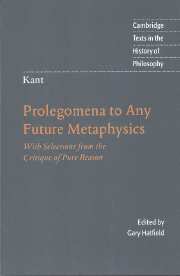Book contents
- Frontmatter
- Contents
- Acknowledgments
- Introduction
- Chronology
- Further reading
- Note on texts and translation
- Prolegomena to Any Future Metaphysics
- Selections from the Critique of Pure Reason
- Table of Contents for the Critique
- From the Preface to the Second Edition
- From the Introduction
- From the Transcendental Aesthetic
- From the Transcendental Logic, Introduction
- From the Transcendental Logic, First Division, Analytic
- From the Transcendental Logic, Second Division, Dialectic
- From the Transcendental Doctrine of Method
- Index
- Cambridge texts in the history of philosophy
From the Preface to the Second Edition
Published online by Cambridge University Press: 05 June 2012
- Frontmatter
- Contents
- Acknowledgments
- Introduction
- Chronology
- Further reading
- Note on texts and translation
- Prolegomena to Any Future Metaphysics
- Selections from the Critique of Pure Reason
- Table of Contents for the Critique
- From the Preface to the Second Edition
- From the Introduction
- From the Transcendental Aesthetic
- From the Transcendental Logic, Introduction
- From the Transcendental Logic, First Division, Analytic
- From the Transcendental Logic, Second Division, Dialectic
- From the Transcendental Doctrine of Method
- Index
- Cambridge texts in the history of philosophy
Summary
Whether or not the cultivation of those cognitions that belong to the occupation of reason treads the sure path of a science can be assessed quickly from the results. If, after repeated preparations and provisions, this cultivation gets bogged down as soon as it arrives at its goal, or if it must often backtrack and take another path to attain this goal; or equally, if it is not possible to unite the various collaborators on the manner in which their common aim should be pursued: then one can always be convinced that such a pursuit has not yet (by far) taken the sure path of science, but is merely groping about; and the discovery of this path, if possible, is already a service to reason, even if much should have to be abandoned as futile that was contained in the goal as previously accepted (without reflection).
That logic has tread this sure path from the most ancient times up to now can be seen from the fact that since Aristotle it has not had to take a single step backward, if the removal of a few superfluous subtleties or the clearer determination of what is presented are not to be reckoned as improvements, which anyway pertain more to the elegance than to the surety of the science. It is further noteworthy about logic that it also has not, up to now, been able to take any step forward, and therefore seems, to all appearance, to be finished and complete.
- Type
- Chapter
- Information
- Kant: Prolegomena to Any Future MetaphysicsWith Selections from the Critique of Pure Reason, pp. 143 - 158Publisher: Cambridge University PressPrint publication year: 1997



